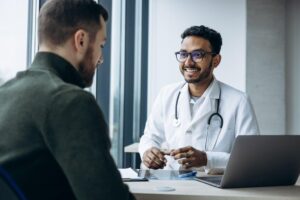
Gastroscopy is a medical procedure used to examine the upper digestive tract, including the esophagus (gullet), stomach and first part of the small intestine (duodenum). It is a safe procedure that can be used to diagnose and treat a range of conditions affecting the digestive tract.
During the procedure, a thin, flexible tube called an endoscope is passed through the mouth and down the esophagus into the stomach. The end of the endoscope contains a light and a small video camera, and transmits images to a TV monitor, allowing the doctor to see the lining of the digestive tract.
If any abnormalities are seen, such as ulcers, the doctor can take tissue samples (biopsies) for further analysis. Gastroscopy is often used to investigate a range of symptoms, such as swallowing difficulties, nausea, vomiting, reflux, bleeding, indigestion, abdominal pain or chest pain.
It is also occasionally used to remove foreign objects, such as swallowed coins, from the digestive tract. Gastroscopy is a safe procedure with minimal risks, and side effects such as sore throat, bloating, and mild abdominal discomfort. The procedure is usually done under sedation or general anesthetic and the patient can usually return home the same day.
If you are experiencing any of the symptoms mentioned above, it is important to speak to your doctor who may recommend a gastroscopy if they think it is necessary. If a gastroscopy is recommended, your doctor will explain the procedure to you in detail, and answer any questions you may have.
Discharge Advice After Gastroscopy
Gastroscopy is a common medical procedure that can provide valuable information about your digestive tract. After the procedure, it is important to follow the discharge advice given to you by your doctor in order to ensure a speedy and safe recovery.
If you have had sedation during your gastroscopy, it is essential that an adult comes to collect you from the hospital and stays with you overnight. This is to ensure that you are properly monitored and do not become unwell due to the effects of the sedation.
Once you are home, it is important to rest quietly for the remainder of the day. It is also important to note that sedation can last longer than expected, so it is important to have someone to stay with you overnight.
You may experience a sore throat after the gastroscopy. While this should not last longer than 24-48 hours, it is important to contact the unit, your GP or the out of hours GP should you experience any severe abdominal pain or become unwell.
Finally, it is important to remember that after having sedation during a gastroscopy, you should avoid the following activities for at least 24 hours:
- Going to work
- Driving
- Operating machinery
- Drinking alcohol
- Signing any legally binding documents
- Carrying out any activities involving heights
- Caring for young children (sole responsibility)
By following these guidelines and the discharge advice given to you by your healthcare team, you can ensure that you make a speedy and safe recovery after having a gastroscopy. If you have any further questions or concerns, it is important to contact your healthcare team.




